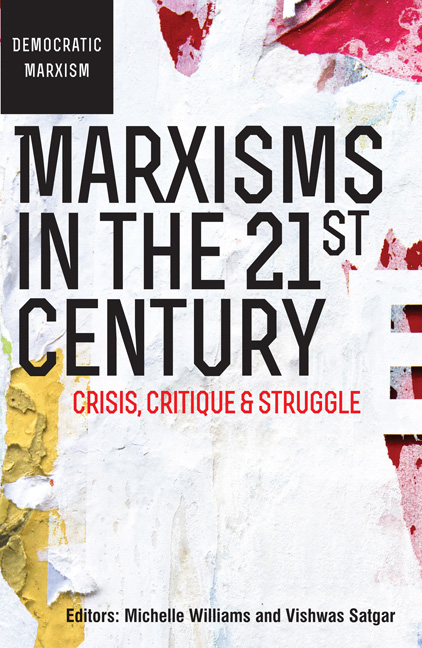Book contents
- Frontmatter
- Miscellaneous Frontmatter
- Acknowledgements
- Contents
- Acronyms and Abbreviations
- Introduction
- PART ONE DEMOCRATISING AND GLOBALISING MARXISM
- PART TWO MARXISM AND LEFT POLITICS
- PART THREE CRISES OF MARXISM IN AFRICA AND POSSIBILITIES FOR THE FUTURE
- Chapter 7 Retrospect: Seven theses about Africa's Marxist regimes
- Chapter 8 Socialism and Southern Africa
- Chapter 9 Uneven and combined Marxism within South Africa's urban social movements
- Chapter 10 Critical reflections on the crisis and limits of ANC ‘Marxism’
- Conclusion
- Contributors
- Index
Chapter 8 - Socialism and Southern Africa
from PART THREE - CRISES OF MARXISM IN AFRICA AND POSSIBILITIES FOR THE FUTURE
Published online by Cambridge University Press: 21 April 2018
- Frontmatter
- Miscellaneous Frontmatter
- Acknowledgements
- Contents
- Acronyms and Abbreviations
- Introduction
- PART ONE DEMOCRATISING AND GLOBALISING MARXISM
- PART TWO MARXISM AND LEFT POLITICS
- PART THREE CRISES OF MARXISM IN AFRICA AND POSSIBILITIES FOR THE FUTURE
- Chapter 7 Retrospect: Seven theses about Africa's Marxist regimes
- Chapter 8 Socialism and Southern Africa
- Chapter 9 Uneven and combined Marxism within South Africa's urban social movements
- Chapter 10 Critical reflections on the crisis and limits of ANC ‘Marxism’
- Conclusion
- Contributors
- Index
Summary
The African continent has been marked by various and remarkably diverse flare-ups of apparent socialist and quasi-socialist intention – from Algeria in the north to Ghana in the west to Ethiopia in the east, with several stops in between. But it is as one approaches the southern cone and moves ever closer to South Africa itself that the intention becomes most marked, not only in rhetoric but also in practice – albeit a practice not as yet concretely realised in any very sustained way. So the question remains: what are we to learn from this southern African regional experience that can provide serviceable lessons for an ongoing struggle to realise equity, social justice and meaningful development in South Africa?
TROPES OF SOCIALIST DEFEAT
After all, one of the stocks-in-trade of African National Congress (ANC)- thinking since South Africa's formal democratisation in 1994 has been to present a negative version of African socialist endeavour elsewhere on the continent and, particularly, within the region. For this version is designed, with varying degrees of caricature, precisely to warn against any feckless dream of a socialist outcome in South Africa itself – however often such an outcome may actually have been invoked by the ANC/South African Communist Party (SACP) itself during the very years of liberation struggle against white dictatorship that it shared with other liberation movements across the region.
Here, one of the favoured tropes – albeit one more often offered in private conversation than in public statement – has been to underscore the lack of realism of the aspiration in general and, in particular, under African conditions and circumstances. This is, of course, a theme sometimes seen in more scholarly offerings. Many decades ago, for example, Roger Murray (1967: 39) queried whether, in Kwame Nkrumah's Ghana, the ‘historically necessary’ (some form of socialism) was in fact the ‘historically possible’. More recently, Giovanni Arrighi would suggest that even in the heyday of ‘liberation movement’ enthusiasm (the 1960s and 1970s) and despite his own direct involvement in one of them (in Zimbabwe) he had himself been appropriately sceptical as to the likelihood or even possibility of socialist outcomes in a liberated southern Africa (Arrighi 2009; Saul 2011: chapter 6).
- Type
- Chapter
- Information
- Marxisms in the 21st CenturyCrisis, Critique & Struggle, pp. 196 - 219Publisher: Wits University PressPrint publication year: 2013



